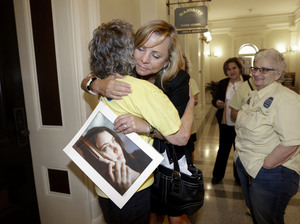
Debbie Ziegler holds a photo of her daughter, Brittany Maynard, as hugs supporter Ellen Pontac after a right-to-die measure was approved by the state Assembly on Wednesday in Sacramento, Calif.
A controversial bill to legalize physician-assisted suicide in California is headed to the governor for consideration, after almost nine months of intense — often personal — debate in the legislature.
If Gov. Jerry Brown signs the bill, California would become the fifth state to allow doctors to prescribe lethal medication to terminally ill patients who request it, after Oregon, Washington, Vermont and Montana.
"Our hope, our fervent hope, is that Gov. Jerry Brown will sign this bill and bring relief to hundreds of dying Californians," said Toni Broaddus, state campaign director for advocacy group Compassion & Choices.
The California bill was modeled after the Oregon law. It requires two different doctors to determine that a patient has six months or less to live before prescribing the drugs. Patients must be physically able to swallow the medication themselves, and must have the mental capacity to make medical decisions.
Numerous additional safeguards were added to the bill in recent months to sway opponents, including a sunset clause that ends the law in 10 years. Patients must request the drugs three times to receive them — once in writing before two witnesses — and they must sign a form two days before ingesting the medication.
"I can assure you that the joint and co-authors on this bill ... have endeavored to build in protections in this law that are stronger than the protections in any of the states where this has been practiced," said Sen. Bill Monning, D-Carmel.
The bill continued to face fierce opposition, however, from religious groups and disability rights advocates. They are concerned that elderly and disabled people, especially those who are low-income, could be pressured into taking the drugs in order to end or avoid expensive, life-sustaining care. They fear the protections are not enough, and that family members or other heirs could slip the drugs to the patient without their knowledge or consent.
"The legislation effectively paints a target on the back of each and every elderly and disabled person in our state," said Sen. Joel Anderson, R-San Diego, paraphrasing an elder abuse advocate. "The promises and assurances of the safeguards and protections from the representatives of those in favor are based in innocent ignorance."
Opponents also criticized the procedure for getting the bill through the Legislature. During the normal legislative session, the bill stalled in the Assembly Health Committee when authors couldn't get enough votes. Several Democrats from Southern California would not support it.
But proponents managed to navigate through that roadblock by re-introducing the bill during a special session on health care financing, where committee memberships were different. The bill passed the Assembly on Wednesday 44 to 35, and it passed the Senate on Friday 23 to 14.
Gov. Jerry Brown's office also criticized the political pathway, saying the special session was not the appropriate venue for the physician-assisted suicide bill. But Brown has not indicated where he stands on the issue itself, nor whether he will sign or veto the bill. If he does nothing, after 30 days the bill will become law.
This story is part of a reporting partnership with NPR, KQED and Kaiser Health News.
9(MDE1MTIxMDg0MDE0MDQ3NTY3MzkzMzY1NA001))
Transcript
SCOTT SIMON, HOST:
A bill to legalize physician-assisted suicide in California is now headed to the desk of Governor Jerry Brown. April Dembosky of KQED in San Francisco explains the state legislature passed the bill yesterday to allow doctors to prescribe lethal medication to terminally-ill patients.
APRIL DEMBOSKY, BYLINE: Lawmakers debated the legislation for nearly nine months. Hearings about the role of the state in allowing sick people to end their lives often became very emotional and very personal. Assemblymember Cheryl Brown, an opponent of the bill, says doctors get it wrong all the time. She says one of her relatives was given six months to live after being diagnosed with pancreatic cancer.
JERRY BROWN: Six months later, he didn't die. Eight years later, after he had become a minister of the gospel, the Lord saw fit to take him home.
DEMBOSKY: But supporters emphasized that the measure is voluntary, and it is meant for people on the brink of death, facing unbearable pain and suffering. Assemblymember Susan Eggman is one of the authors of the bill.
SUSAN EGGMAN: We are a death-denying culture. People don't want to talk about it, thinking it won't happen to them. So our hope in being able to forward this legislation - to provide people who want it - options when they face the end of their life - will be able to further everybody to have these difficult conversations with their families.
DEMBOSKY: The bill includes numerous rules and protections. Patients must be mentally competent and physically able to swallow the lethal medication themselves. They must request the drugs three times before they can receive them. But some opponents say these protections aren't enough to prevent coercion.
JOEL ANDERSON: The legislation effectively paints a target on the back of each and every elderly and disabled person in our state.
DEMBOSKY: State Senator Joel Anderson repeated the concerns of elder abuse advocates who say heirs could still slip the medication to patients without their knowledge.
ANDERSON: We know, time after time, that money can move people to do evil things.
DEMBOSKY: Governor Jerry Brown now has 30 days to sign or veto the bill. He has not indicated what he will do. For NPR News, I'm April Dembosky in San Francisco.
SIMON: And that story is part of a reporting partnership between NPR, KQED, and Kaiser Health News. Transcript provided by NPR, Copyright NPR.
300x250 Ad
300x250 Ad